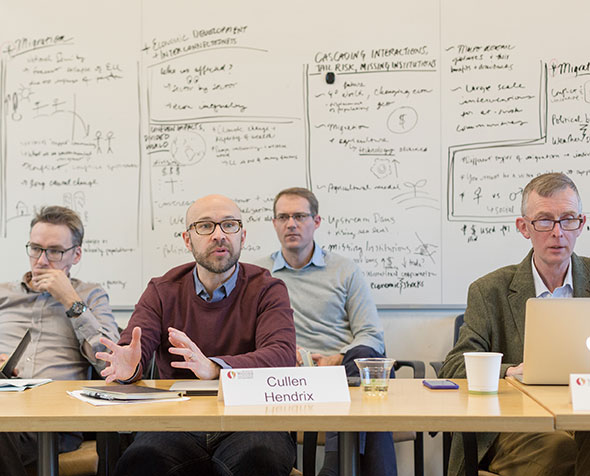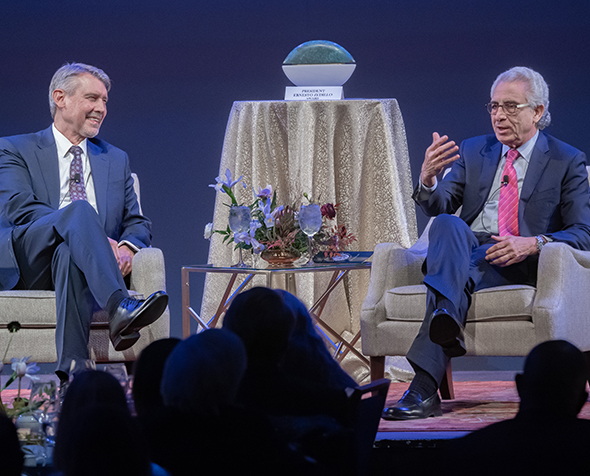As the need to act on climate is more apparent, are the world's democracies up to the task?
Op-Ed by Dean Fritz Mayer
Originally published in The Hill.

© Ian Waldie/Getty Images
With every passing year, the looming threat of climate change becomes more real, its impacts not distant and uncertain but present and unescapable. Early manifestations — droughts and dislocations, floods and hurricanes, wildfires and heatwaves — are mere harbingers of what is to come if humanity fails to act. It takes some effort not to see where we are heading.
We know all this and yet we do not act with anything like the urgency the moment demands.
Some have begun to question whether the world’s democracies are up to the task. Certainly, even a casual look at U.S. politics suggests that this is a reasonable question. The essential characteristics of climate change are daunting. Its global scope requires international cooperation, the long lag before its full effects are evident requires foresight, and the wrenching changes required both to minimize it and to cope with its impacts require hard tradeoffs. Climate change is a “wicked” problem for all governments, but perhaps even more so for democracies, which must persuade their publics to make sacrifices for the global good and for future generations, and to make painful choices quickly.
Climate change may be democracy’s greatest test, and it is struggling to meet it.
Yet it is not only the limitations of democracy to confront climate change that should worry us, but also the perilous threat that climate change poses to democracy.
The pathways through which climate change threatens democracy are numerous, as a recent report persuasively summarizes.
Two impacts of climate change are particularly dangerous.
First, climate change exacerbates economic inequality, as those with greater means are better able to adapt to its impacts than those of lesser means. And perhaps nothing is more destabilizing in a democracy than extreme economic inequality. Throughout history, inequality has undermined political legitimacy, making societies ripe for revolutionaries and demagogues alike.
Second, climate change increases migration, as extreme weather, increased flooding, drought, and wildfires make life less tenable in many places. Like inequality, rapid migration is deeply destabilizing, both in the country of departure and in recipient countries, often feeding the xenophobia and intense nationalism that undermine democracy, as we are seeing in Europe and the United States.
In some quarters, there is whispering that perhaps we need less democracy to save the planet, that maybe the China model is better than the American. The Chinese, of course, trumpet it. But there is little reason to believe that autocratic governments will do better, and many reasons to believe that they will do far worse. In this, as in so many matters, democracy is the worst form of government, excepting all others.
The only path forward is to repair our existing democratic institutions and build new ones better suited to the task at hand. The conundrum is that while we need effective democratic governance to mitigate and adapt to climate change, climate change is making democracies increasingly dysfunctional.
That’s why climate and democracy is a major focus of the upcoming Denver Democracy Summit, a non-partisan gathering of the experts, leaders, and policymakers from around the world hosted by the Josef Korbel School of International Studies. Our goal is not just to sound the alarm, but to catalyze action. The question, then, is what is to be done?
Of course, we need to do everything possible to shore up democratic governance (as if we needed more reasons to do so!). Combating misinformation, restoring trust in public institutions, creating more inclusive processes, and protecting basic civil and human rights are all vital in their own right, but crucial if we are to address climate change.
But as we seek to make progress on the broad challenges to democracy, we should also focus particular attention on limiting the impact of the biggest climate-driven contributors to democratic decline.
First, we need to do all we can to limit the inequitable impacts of climate change, in the United States and around the world. In the U.S. that means much more aggressive funding targeted at those least able to adapt to what is coming including funding for relocating from low-lying areas, for transforming farming practices, for health care needs associated with higher heat, and much more. At the global level, we need much greater investment by wealthy nations in the poorer, for many of the same reasons.
Second, we need to focus on climate migration. Not hardening borders, but addressing root causes like providing assistance to enable farmers to adapt their practices, making more efficient use of scarce freshwater resources, creating greater economic opportunity in poorer regions of the world, and more.
Without climate justice, democracy will fail.






